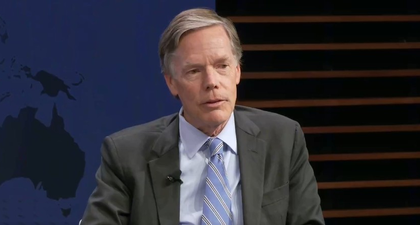Quad a way to 'cement relationship' with India: Ex-US Diplomat Nicholas Burns
By IANS | Updated: October 22, 2025 11:20 IST2025-10-22T11:16:36+5:302025-10-22T11:20:20+5:30
Washington, Oct 22 Former Diplomat Nicholas Burns said that the Quad grouping is a way to "cement our ...

Quad a way to 'cement relationship' with India: Ex-US Diplomat Nicholas Burns
Washington, Oct 22 Former Diplomat Nicholas Burns said that the Quad grouping is a way to "cement our relationship" with India and keep the country "closely knit" with Washington on security affairs.
While speaking at an event at the Atlantic Council on Tuesday (local time), former US Ambassador to China and a key architect of a stronger India-US relationship, Burns, responded to a question from IANS about his analysis of the Trump administration's policy towards the Quad -- a grouping of four democracies of India, Japan, Australia and the United States.
"The Quad began in 2006-07 when I was the Undersecretary of State. I participated in some Quad meetings, but never at the head of government level. President Trump is the one who made it a head of government exercise in his first term," he said.
"I know that there was an early meeting this year. Secretary Rubio participated in a Quad foreign ministers [meeting]…At some point, I think I've heard they want to have a heads of government meeting, and I hope they do. It's a way to cement our relationship - Japan, Australia, the United States - treaty allies, with India, and to keep India closely knit to us on security affairs. So, I do hope it happens," Burns told IANS.
Trump was scheduled to attend the Quad Summit in November in India, but it's likely to be rescheduled early next year.
Last week, a group of bipartisan US lawmakers also wrote to Trump, urging him to attend the Quad Leaders' Summit in India and other meetings in Asia.
Representative Gregory W. Meeks, Ranking Member of the House Foreign Affairs Committee, led the effort, and the co-signers include Chairwoman and Ranking Member of the East Asia and Pacific Subcommittee, Young Kim and Ami Bera, and Chairman and Ranking Member of the South and Central Asia Subcommittee, Bill Huizenga and Sydney Kamlager-Dove.
"Our Quad partnership with Australia, Japan, and India serves as the cornerstone for advancing our shared interests in the Indo-Pacific," it added.
The letter followed an amendment by Democratic Congresswoman Kamlager-Dove in the Department of State Policy Provisions Act, urging Trump to "continue his leadership in the Quad and personally attend the Quad Leaders' Summit" later this year.
The amendment was passed by a voice vote and is now part of the bill that would be taken up for a vote in the House of Representatives soon.
In an interview with IANS in early October, Kamlager-Dove called the Quad Summit "incredibly important" and highlighted her amendment.
"Why do you have to tell a president to participate in and to attend a Quad Leadership Summit? That's about unity with our partners across the Indo-Pacific," she said.
Burns, who played an important role in the India-US Civil Nuclear Agreement as the Undersecretary of State for Political Affairs from 2005-2008, also criticised the Trump administration's 50 per cent tariffs on India, saying it may harm "the ability to have a fully effective defence relationship with the Indian government."
"You put 50 per cent tariffs on India, you're going to have a crisis with India, and maybe that harms your ability to have a fully effective defence relationship with the Indian government. I would choose a defence relationship, frankly, over tariffs, if you have to choose, and sometimes in life and in diplomacy, you have to choose," he told IANS.
Burns, who is now a Professor at Harvard University, stressed that during his tenure in the George W Bush presidency, the US realised that the "strategic rise of India in the world was in the national security interests of the United States."
"We could already see, even in the George W. Bush administration, that we would have this long-term competition rivalry with China in the Indo-Pacific, and India's involvement with us in a peaceful way would be critical," he noted.
He also termed India as a "great strategic partner" of the United States, along with Japan, South Korea, Australia and the EU, advocating a united front to tackle the China challenge.
"We always found in our administration that the power of the United States and our ability to work with China will be enhanced if we work with Japan, South Korea, Australia, and, of course, India, our great strategic partner," he added.
Disclaimer: This post has been auto-published from an agency feed without any modifications to the text and has not been reviewed by an editor
Open in app